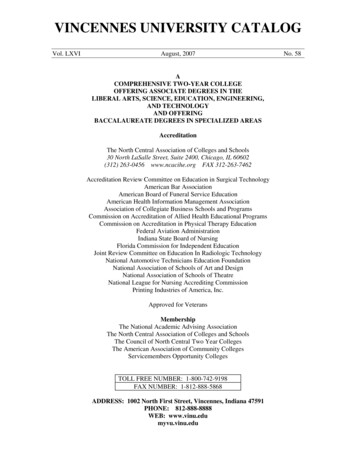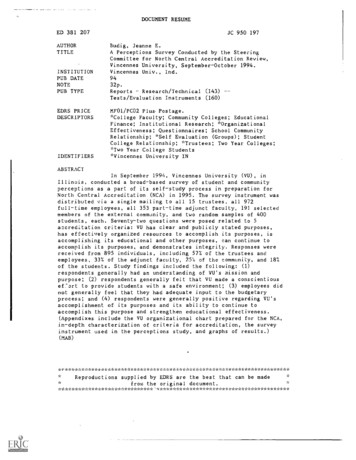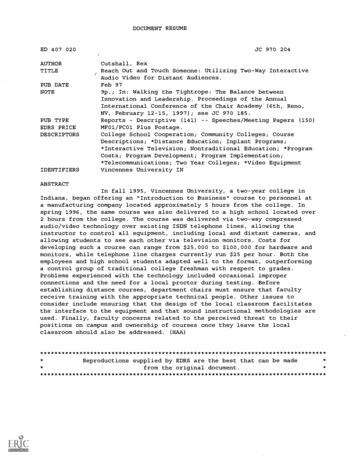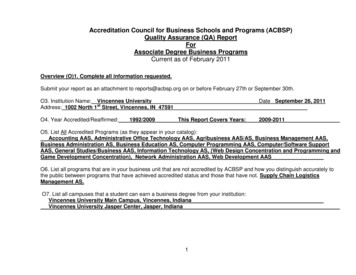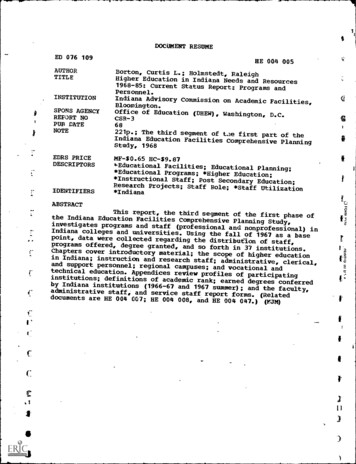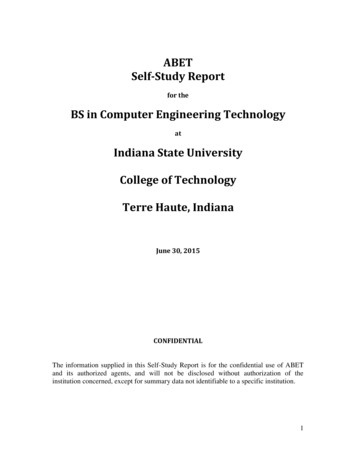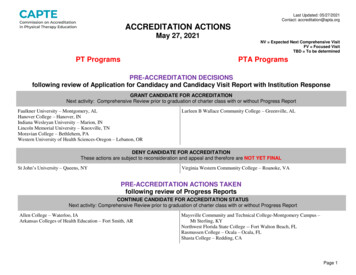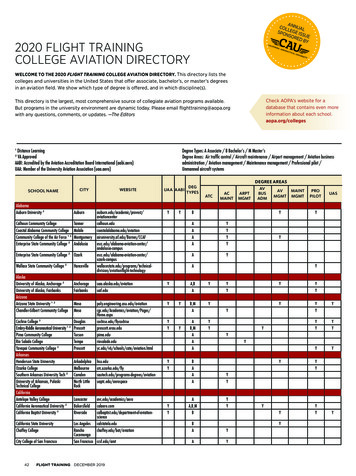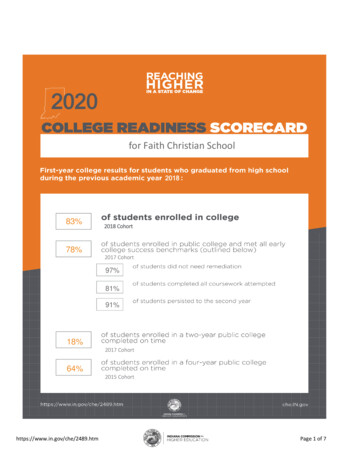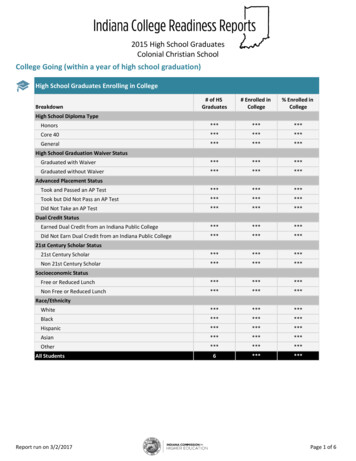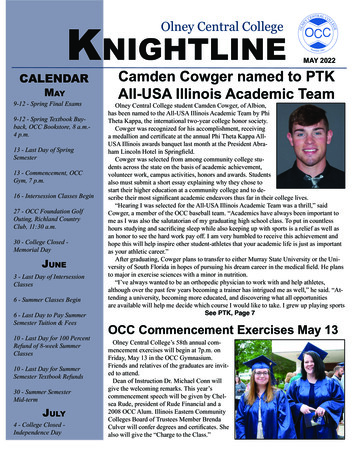
Transcription
VINCENNES UNIVERSITYEDUCATION PROGRAMPRECONDITIONSSubmitted toNCATESeptember, 2011Contact: Jan Henry, ChairJhenry@vinu.edu-1-
Precondition 1.1 Letter from Dr. Richard Helton2
3
Precondition 1.2 Programs for the Preparation of Teachers at Vincennes UniversityMain Campus, Vincennes, IndianaName of ProgramDegree AwardedHousedResponsibilitySpecial Education,Mild Intervention/ElementaryBachelor of ScienceEducation DepartmentEducation DepartmentScience EducationBachelor of ScienceMathandDivisionScience Education DepartmentMathematics EducationBachelor of ScienceBachelor of ArtsMathandDivisionScience Education DepartmentJasper Campus, Jasper, IndianaName of ProgramDegree AwardedHousedResponsibilitySpecial Education,Mild Intervention/ElementaryBachelor of ScienceJasper CampusEducation Department,Main Campus4
Precondition 1.3Organizational ChartVINCENNES UNIVERSITY ORGANIZATIONAL CHARTOn the following page, you will see a visual overview of the organization of VincennesUniversity.Additionally, on the page following the organization chart, you will see a visual overview of theEducation Program5
Vincennes UniversityBoard of TrusteesOrganizational Chart8/4/2006PresidentGovernanceVP for Financial Serv &Govt RelationsFoundationStrategic PlanningProvost and VP for InstServ/Dean of FacultyVP for Workforce Dev/Community ServicesExternal RelationsAdult BasicEducationAlumniAsst Provost forStudent AffairsAffirmative Action/Human ResourcesAsst Provost forAcad AffairsAthleticsArchitectural Serv &FacilitiesAssoc VP ceVUJCCareer okstoreCounselingBursarDean alStudentsPrint MediaServBusiness Serv andBudgetsGrants OfficeMICPhysical PlantEnvironmentalSafetyHonors onsProject EXCEL/Project LINK/OffCampus Cont EducParent/FamilyServicesUniversityEventsVeterans UpwardBoundUniversityRelationsWorkforceDevelopment ServLRCPayrollProf eMilitary EducDisabilityServ/PASSFinancial AidAdvising Center/OnCampus Continuing EducAdmissionsBusiness entSportsInformationIndiana ntalEducationStudentActivitiesGeneralEducationEduc Talent SearchFood ServHealth Serv*THE PROVOST AND VICE PRESIDENT FOR INSTRUCTIONAL SERVICES/DEAN OF FACULTY WILLHousing/Res LifeALSO HAVE RESPONSIBILITIES FOR THE UNIVERSITY SYSTEM AND WILL SERVE AS THESPOKESPERSON IN THE ABSENCE OF THE PRESIDENT.Indiana TeenInstitutePlacement/Veterans Affairs21st CenturyScholarsUpward Bound*ACADEMIC MATTERS REGARDING WORKFORCE DEVELOPMENT/COMMUNITY SERVICES WILLBE CLEARED THROUGH THE PROVOST AND VICE PRESIDENT FOR INSTRUCTIONAL SERVICES/DEAN OF FACULTY.Project ASPIREERegistrarUpward BoundMath/Science*EACH VICE PRESIDENT SHALL HAVE BUDGETARY RESPONSIBILITIES AND ACCOUNTABILITY INHIS/HER RESPECTIVE AREA.6
7
Precondition 2.1 Electronic Links to Unit Policies and ProceduresThe following electronic links provide access to unit policies and procedures including the 20102011 University Catalog, the University Manual/Faculty Policies, the Vincennes UniversityEducation Program Handbook, and the Student Teaching Handbook: Vincennes University Catalog 2010-2011 University Manual/Faculty Handbook Vincennes University Education Program Handbook Student Teaching HandbookPrecondition 2.2Electronic Links to Requirements for Entry to, Retention in, andCompletion of Educator Preparation ProgramsThe following are the electronic links to the Education Program Gateways which detail therequirements for entry into, retention in, and completion of the Vincennes University EducationBaccalaureate degree programs in Special Education, Mild Intervention/Elementary Educationand the Secondary Mathematics and Science programs:Education Program Gateways: Requirements for entry into, retention in, and completion of the Bachelor’s degreeprograms in Special Education, Mild Intervention/Elementary Education: Requirements for entry into, retention in, and completion of the Bachelor’s degreeprograms in Secondary Mathematics Education, and Secondary Science Education:8
Precondition 3.1A List of Programs Indicates Those That Will Be Submitted toNCATE for Review One Year Prior to the Visit.Name of ProgramSpecial Education, Mild Intervention/Elementary EducationSecondary Science EducationSecondary Mathematics EducationThe Special Education, Mild Intervention program was submitted to Council for ExceptionalChildren (CEC) SPA and received National Recognition.The Elementary Education program was submitted to Association for Childhood EducationInternational (ACEI) SPA and received National Recognition with one condition.The Secondary Science Education program was submitted to the National Science Educationand Teaching (NSTA) SPA and is under review.The Secondary Mathematics Education program was submitted to the National Council ofTeachers of Mathematics (NCTM) SPA and is under review.Precondition 4.1 Introduction and Overview of the Conceptual FrameworkIntroductionVincennes University has had a distinguished history, rich with the tradition of many firsts.Vincennes University is one of the first two-year colleges in America, as well as Indiana’soldest college. The heritage of the University began with the Northwest Ordinance of 1787which states, “Religion, morality, and knowledge being necessary to good government and tothe happiness of mankind, schools, and the means of education shall forever be encouraged.”In 1801, Jefferson Academy, the direct forerunner of Vincennes University, was founded.The Indiana territorial legislature, at its first session in 1806, passed an act to incorporate thefirst university in the Indiana Territory, “to be called and known by the name and style ofVincennes University.” William Henry Harrison, first governor of the Indiana Territory, andlater President of the United States, was the founder of the college and the first chairman ofthe Board of Trustees of the University. In the Vincennes University catalog of 1899, thestatement appeared that, “Vincennes University is in fact a junior college offering the first twoyears of the regular college programs.” By that statement, Vincennes University claims to beone of the first colleges to develop and recognize the junior college concept in highereducation.Today, Vincennes University is a model comprehensive two-year "university" offering more-9-
than 150 associate degree programs and options and seven baccalaureate degrees inspecialized areas. Vincennes University has a statewide mission and is fully state-supported.In addition to the Vincennes campus, the University has a second campus in Jasper, Indianaand major extension sites at the International Airport in Indianapolis and the Indiana Schoolfor the Deaf, also in Indianapolis. Vincennes University maintains an “Open Door”admissions policy. Students are eligible for admission on the basis of graduation with a highschool diploma, successful completion of the General Education Development (GED) Test, orstudents may transfer to VU if they are a student in good standing at an accredited college.The Education Department at VU currently is housed within the Division of Social Sciencesand Performing Arts. The Education Department was initiated at VU in the mid-sixties andhas offered associate degrees in education since that time. In 2004, the Indiana Commissionfor Higher Education granted Vincennes University permission to develop baccalaureatedegree education programs in the following areas: (1) Special Education, Mild Intervention,(2) Secondary Mathematics Education, and (3) Secondary Science Education. Theseprograms were developed to address state-wide teacher shortages in those specific areas. Onenotable change is that, due to the No Child Left Behind Act of 2001, the Education facultyrecognized the importance of graduating “highly qualified” special education teachercandidates. To ensure the highly qualified status, elementary education courses weredeveloped and incorporated into the special education curriculum. According to the IndianaDivision of Professional Standards this enables Vincennes University teacher candidates toapply for a standard license in Exceptional Needs, Mild Intervention/Elementary Educationand/or a generalist license in Elementary Education.Overview of the Conceptual FrameworkIn the summer of 2004, the Education Curriculum and Standards Committee of the EducationDepartment assembled to develop the conceptual framework for the baccalaureate degreeprograms. Through a series of meetings the committee intensely examined the university’sphilosophy, mission, and vision statements. The Vincennes University motto, “Learn in orderto serve,” was adopted by education faculty as the foundation for the education program.Faculty members believe that these simple words carry an essential message for educators.When teaching that takes place in the classroom and beyond culminates in learning for alifetime, then service to the individual, the community, and the world will become a reality.The Education Department faculty members and select faculty from the Mathematics andScience Department crafted the vision and mission statements for the baccalaureate degreeeducation programs. Faculty members collaborated to define and articulate the educationprogram’s purpose, philosophy, and guiding principles. This initial work of the educationfaculty was presented to the Teacher Education Advisory Committee (TEAC) and revisionswere made based on the TEAC members’ recommendations. Work on the program has beenongoing since that time through the collaborative efforts of faculty members, educationprofessionals in the field, community representatives, TEAC, and students to refineexpectations for candidates, unit operations, and to create a comprehensive assessment system10
The vision, mission, and philosophy statements of the Education Program signify highexpectations for both faculty and teacher candidates. The vision and mission statementscommunicate the importance of dedicated teachers who possess the knowledge, skills anddispositions to educate and serve a diverse range of students, their families, and theircommunities. The characteristics necessary for achieving the VU vision and mission aredepicted in the five Guiding principles of the Vincennes University education program andare supported by the knowledge base.The Education Program’s assessment system was developed to provide a process forcontinuous review and assessment of candidates, faculty, programs, and unit operations.Candidate assessment data is collected and reviewed annually by faculty members to ensureprogress in meeting VU, state, and national standards. Further, key assessments (HallmarkArtifacts required from select education courses), practicum evaluations, student teacherevaluations, dispositional rating scales, teacher candidate exit surveys, and programevaluations completed by cooperating teachers, alumni, and employers are collected andanalyzed to assess the effectiveness of the programs in preparing VU teacher candidates.Improvement plans for the program are based on the results of the data analysis.Precondition 4.2 The Vision and Mission of the Institution and UnitVincennes University VisionVincennes University is a premier learning institution, widely recognized for leadership ininnovation and delivery of successful educational experiences. A breadth of programofferings and a commitment to quality service ensure the University’s role as an importantlink in Indiana’s economic and cultural vitality. Vincennes University is a diverse communitywhose members all share responsibility for supporting the University mission and arerespected for their contributions.(Vincennes University Catalog, 2010-2011, p.1)Vincennes University MissionVincennes University, Indiana’s first college, is the State’s premier transfer institution andleader in innovative career programming. The community ensures educational access,delivers proven associate and baccalaureate programs, and offers cultural opportunities andcommunity services in a diverse, student-centered, collegiate environment.(Vincennes University Catalog, 2010-2011, p.1)Vincennes University MottoThe University’s motto, as translated from the official seal, is “Learn in Order to Serve.” Fortwo centuries, Vincennes University students and graduates have sought and achieved thatgoal (Vincennes University Catalog, 2010-2011, p.1)11
The Education Program at Vincennes UniversityThe Vincennes University motto, “Learn in order to serve,” was adopted by the educationfaculty as the program goal. The conceptual framework of the Education program was builtupon the university philosophy, mission, and vision and has evolved from work begun by theEducation Curriculum and Standards Committee of the Education Department and continuedthrough the collaborative efforts of numerous education professionals, communityrepresentatives, students, and members of the Teacher Education Advisory Committee.The Vision of the Education ProgramUnited as a learning community, we challenge our students and ourselves to the ideals oflearning, teaching, and serving. We envision a community of scholars who will learn withenthusiasm, teach with wisdom, and serve with commitment.The Mission of the Education ProgramTeacher education at Vincennes University provides the highest quality preparation forteacher candidates so they will learn, teach, and be of service to others. Entering the thirdcentury as an institution of higher education, our teaching candidates are knowledgeable,skillful, and caring professionals who embrace and support diversity and enable all students tolearn.12
Precondition 4.3 The Unit’s Philosophy, Purposes, and GoalsThe philosophy of the Education faculty is based upon the shared vision of providingVincennes University teacher candidates with the highest quality teacher preparation program.The bridge in the programmatic theme illustration exemplifies the education faculty’sphilosophy. The supports of the bridge represent the five guiding principles upon which thecurriculum is based. Teacher candidates from Vincennes University will possess thefollowing: (1) content knowledge and pedagogy, (2) proficiency in managing and monitoringclassrooms, (3) systematically reflecting upon their practice, (4) participating in learningcommunities, and (5) using technology to enhance student learning. Faculty members presentteacher candidates with the knowledge and skills they will need to be successful in theteaching profession and guide them as they begin to establish their own professionalidentities. Faculty also link teacher candidates’ learning -- the acquisition of knowledge,skills, and dispositions -- with the services they ultimately will provide to their communitiesas education professionals.The Faculty: TeachingThe education faculty commits to providing high quality teacher preparation programs to theircandidates. Using both explicit and implicit instructional methods, observation, andparticipation in a variety of field placements, faculty members provide teacher candidateswith the knowledge, skills, and practical experiences that are necessary for the developmentof effective education professionals. Further, faculty members are committed to modelingbest practices for their teacher candidates as the faculty themselves participate in life-longlearning, create positive learning environments within their courses, engage in criticalthinking and reflective practice, and collaborate with others in learning communities.The members of the education faculty commit to being life-long learners, staying current in13
their respective fields, and infusing 21st century skills into learning. Members of the facultycontinue to grow in their abilities to blend theory and practice. Faculty plan and delivercontemporary, research-based curricula and instructional practices through an interweaving ofcourses and practical experiences. The use of instructional and assistive technology isincorporated across courses and environments. Members of the faculty participate in theactivities of professional organizations and attend conferences and workshops to facilitateprofessional growth.Further, education faculty commit to designing learning environments within their courses inwhich teacher candidates are encouraged to take risks, ask questions, and seek answersthrough investigation and exploration so that they may discover, create, and establish theirown professional identity. Faculty members model appropriate verbal and nonverbalcommunication skills and engage in positive interactions to create learning environments thatpromote mutual respect among all participants in the learning community, support thedevelopment of self efficacy, and encourage an appreciation for diversity. Faculty membersserve as role models who demonstrate respect for the thoughts and beliefs of others.Faculty members also believe that critical thinking and reflective practice are crucialcomponents of the educational process that influence appropriate and effective decisionmaking related to planning, implementing, and assessing curricula. Faculty demonstratereflection and provide teacher candidates with opportunities to reflect on the beliefs andperceptions that they bring to their practice. Faculty members also guide and direct teachercandidates to reflect on their practice, on their responsiveness to students, and on their impacton student learning.Furthermore, faculty members believe that continuous interaction and shared responsibilityamong the various members of the learning community are essential in the preparation ofhighly qualified teachers. Members of the faculty promote and model collaboration skills forteacher candidates by engaging with other professionals in course development and delivery,by coordinating instruction and assignments, and by working together to create seamlesseducation programs. In addition, members of the faculty collaborate with classroomsupervising teachers to provide supports for teacher candidates during field experiences, aswell as to provide support and assistance to the host classroom supervising teacher. Facultymembers also promote the development of communication and collaboration skills amongteacher candidates by engaging them in group discussions, activities, microteaching, casestudies, and collaborative assignments in coursework and in field experiences.The Teacher Candidate: LearningThe faculty of the education program commits to preparing skillful teachers who are fullyprepared to enter the field of teaching and who are dedicated to their profession and to thestudents they serve. The faculty believes that the successful teacher will possess thenecessary knowledge, skills, and dispositions, will create learning environments thatappreciate and honor diversity and engage students in the teaching/learning process, willstrive for meaningful collaboration with a variety of stakeholders, and will engage in critical14
thinking and reflective practice.The effective teacher candidate knows and understands the historical, philosophical,sociological, legal, and developmental foundations of education. In addition, the successfulteacher candidate has breadth and depth of content knowledge to be able to make the choicesand decisions that are required in today’s classrooms. The effective teacher candidatepossesses knowledge about learners that allows for effective teaching at the appropriatedevelopmental and cognitive levels. The effective teacher candidate considers theimportance of building upon prior knowledge and experiences of the students and usesapproaches that capitalize on learners’ knowledge and experiences for effective learning. Theeffective teacher
Vincennes University has had a distinguished history, rich with the tradition of many firsts. Vincennes University is one of the first two-year colleges in America, as well as Indiana’s oldest college. The heritage of
